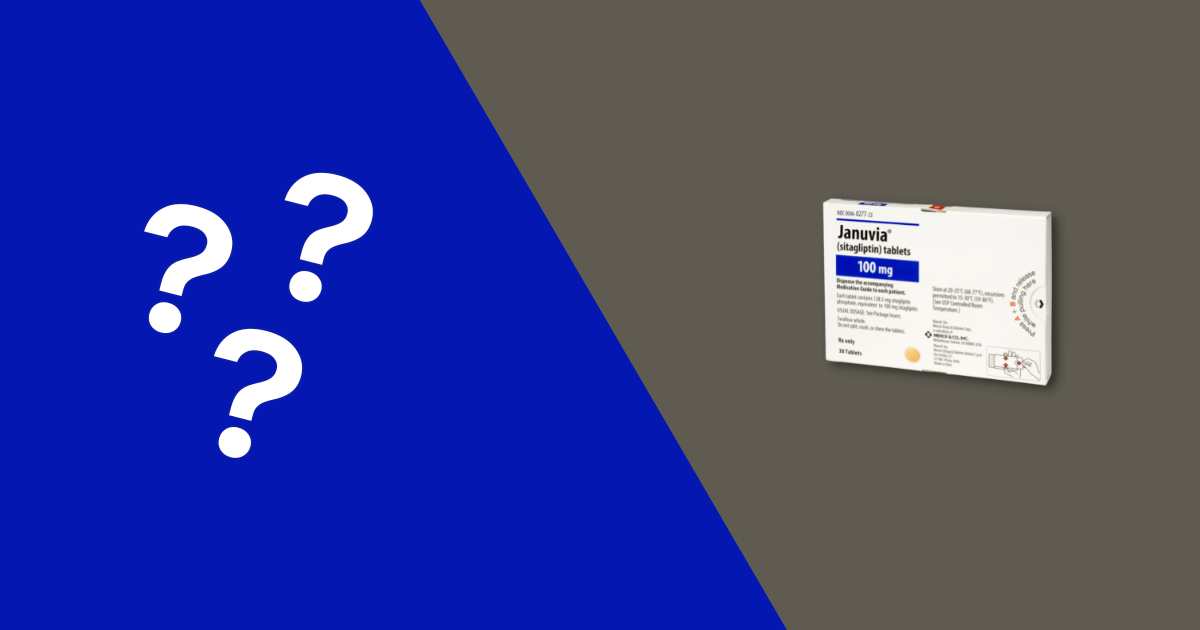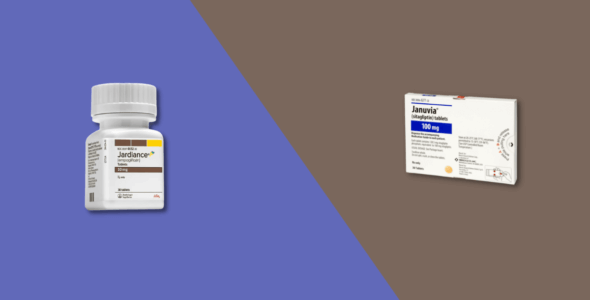Januvia alternatives for type 2 diabetes
Januvia is a brand name diabetes drug manufactured by Merck Pharmaceuticals. It is one of many diabetes medicines used to control blood glucose levels in people with type 2 diabetes mellitus.
The number of medications available to treat type 2 diabetes in particular, is long and confusing at first. No single diabetes treatment is best for everyone and what works for one person may not work for another. Always seek medical advice when considering changing medication.
Let us take a look at the alternative diabetes medications available to Januvia, simplify how they work, and what common side effects they may have. This knowledge will allow you to discuss the different treatment options with your doctor.
What is Januvia?
Januvia is a prescription medicine approved by the U.S Food and Drug Administration to:
- Treat type 2 diabetes, by helping to lower blood sugar levels when used in combination with exercise and changes to your diet
In type 2 diabetes you do produce insulin, but the body can not use it effectively. There is usually a combination of a part failure of insulin production and a reduced response to the hormone. This is known as insulin resistance. Research does not give us a clear idea why some people develop this and others don’t, but lifestyle factors, e.g. lack of exercise and excess body weight can contribute to type 2 diabetes. Januvia is not recommended to be used to treat type 1 diabetes.
Januvia active ingredients
The active ingredient in Januvia is called sitagliptin. It works by increasing the amount of insulin you produce after you’ve eaten.
When you digest food, your stomach and gut produce digestive hormones called GLP-1 and GIP. These hormones make your pancreas secrete insulin. As you continue to digest your food, the digestive hormones are broken down by an enzyme called dipeptidyl peptidase-4 (DPP-4) to allow your levels of insulin to fall again.
Sitagliptin stops the DPP-4 enzyme from breaking down the digestive hormones. This keeps the hormones active for longer, making you produce more insulin, and lowering your blood sugar to normal levels.
Side effects of Januvia
The most common side effects of Januvia include:
- Headaches
- Stuffy or runny nose
- Sore throat
- An increase in upper respiratory tract infections, like colds, sinus infections, and the flu
- Constipatio
Often these side effects disappear after a few weeks of use. Occasionally, Januvia can cause more serious side effects. These include:
- Severe joint pain
- Heart failure
- Inflammation of the pancreas (pancreatitis) can be fatal in severe cases
- Serious allergic reactions to the medication can cause anaphylaxis – a potentially life-threatening condition where your immune system overreacts, causing hives, swelling in your face, mouth, and throat that causes shortness of breath and trouble breathing
- Kidney problems that can reduce kidney function or require dialysis
- Dangerously low blood sugar levels (hypoglycemia)
Your doctor will assess your risk of side effects versus the benefits of taking Januvia.
If you take Januvia you could experience side effects, including the most serious, but everyone reacts differently to medication. If you have any concerns about side effects, talk to your physician or a pharmacist. You may report side effects to the FDA at 1-800-FDA-1088 or at www.fda.gov/medwatch.
Get your diabetes medication for only $49 per month
Get StartedJanuvia alternatives
Biguanides
This class of drug is one of the earliest medications for diabetes. Biguanides such as metformin are used regularly as a first-line treatment for type 2 diabetes and are the most common medication used for diabetics. It is unsuitable for anyone with liver, kidney, or heart problems.
How do Biguanides work?
- Slows down the absorption of glucose from your intestines
- Reduces how much sugar your liver makes
- Helps to reduce your insulin resistance
Advantages of Biguanides
- No weight gain side effects
- Very effective
The most common side effects caused by Biguanides include:
- Decrease in vitamin B12 absorption
- Bloating
- Diarrhea
- Nausea
- Weight loss
Common Biguanides brands:
- Glucophage – metformin
- Glumetza – metformin
Meglitinides
How do Metiglinides work?
- Stimulates the release of insulin from your pancreas
Advantages of Metiglinides:
- Works quickly
- Allows you to be flexible with your dose
The most common side effects caused by Meglitinides include:
- Stomach pain
- Indigestion
- Feeling sick
- Diarrhea
- Weight gain
- Low blood sugar (hypoglycemia)
Popular Meglitinide brands include:
- Prandin (repaglinide)
- Prandimet (repaglinide-metformin)
- Starlix (nateglinide)
Sulfonylureas
How do Sulfonylureas work?
- Stimulates the cells of your pancreas to make and release more insulin
Advantages of Sulfonylureas:
- Effective in lowering your blood sugar level
- You can take different formulations
The most common side effects caused by Sulfonylureas:
- Diarrhea
- Feeling sick
- Skin rashes
- Itching
- Weight gain
- Low blood sugar (hypoglycemia)
As with insulin, Sulfonylureas can be classed as short, medium, or long-acting depending on how fast they work.
- Short-acting – tolbutamide (Rastinon)
- Medium-acting – glimepiride (Amaryl)
- Long-acting – chloropropamide (Diabinese)
Glinides
How do Glinides work?
- Stimulates your pancreas to produce more insulin
Advantages of Glinides:
- Fast-acting
Possible side effects:
- Low blood sugar
- Weight gain
- Nausea
- Diarrhea
- Constipation
Common Glinides:
- Prandin – repaglinide
- Starlix – nateglinide
Thiazolidinediones
How do Thiazolidinediones work?
- Causes changes in your muscle and fat cells where insulin resistance occurs
Advantages of Thiazolidinediones:
- Does not cause low blood sugar
- May protect beta cells in your pancreas
The most common side effects caused by Thiazolidinediones include:
- Headaches
- An increase in upper respiratory tract infections (like colds and throat infections)
- Fluid build-up that causes swelling in your hands, feet, and ankles
- Weight gain
Popular Thiazolidinediones include:
- Actos – pioglitazone
- Avandia – rosiglitazone
Alpha-glucosidase inhibitors
How do Alpha-glucosidase inhibitors work?
- Interrupts the breakdown of carbohydrates into sugar in your gut, so it stops your body from absorbing glucose
Advantages of Alpha-glucosidase inhibitors:
- Especially useful if you have type 2 diabetes where your blood sugar tends to be most out of control after eating
The most common side effects caused by Alpha-glucosidase inhibitors include:
- Bloating
- Gas
- Diarrhea
- Abdominal cramps
- Stomach pain
Common brands include:
- Glyset – miglitol
- Precose – acarbose
Dopamine agonists
How do Dopamine agonists work?
- It’s not known exactly how this drug works to treat type 2 diabetes. It may affect rhythms in your body and prevent insulin resistance
Advantages of Dopamine agonists:
- Does not cause low blood sugar or weight gain
The most common side effects caused by Dopamine agonists include:
- Heartburn
- Feeling sick
- Vomiting
- Loss of appetite
- Drowsiness
- Dizziness
Common brands include:
- Cycloset – bromocriptine
Dipeptidyl peptidase-4 (DPP-4) inhibitors (Gliptins)
Januvia is in this drug class and there are alternatives within the same class you may want to consider.
How do Dipeptidyl peptidase-4 inhibitors work?
- Blocks the production of an enzyme called Dipeptidyl peptidase-4 allowing your body to release more insulin
Advantages of Dipeptidyl peptidase-4 inhibitors:
- Does not cause low blood sugar or weight gain
- Possible beneficial effects on cholesterol levels
The most common side effects caused by DPP-4 inhibitors include:
- Upper respiratory infection
- Nausea
- Headaches
- Mild indigestion
Common brands:
- Onglyza – saxagliptin
- Galvus – vildagliptin
Glucagon-like peptide-1 receptor agonists (GLP-1 receptor agonists) / Incretin memetics
How does it work?
- An injected medicine that helps prevent your blood sugar from rising after eating by slowing the rate of digestion and the release of insulin
Advantages:
- May suppress hunger
- Modest weight loss
Side effects:
- Nausea
- Headache
- Diarrhea
- Low blood sugar
Common brands:
- Tanzeum – albiglutide
- Trulicity – dulaglutide
- Byetta -exenatide
- Bydureon Bcise – exenatide extended-release
- Victoza – liraglutide
- Ozempic – semaglutide
Amylin mimetics
How do Amylin mimetics work?
- Helps control your glucose levels
- Slows the movement of food through your stomach
- Used with insulin injections
Advantages of Amylin mimetics:
- May suppress hunger
- It may help with some weight loss
Possible side effects:
- Hypoglycemia (low blood sugar levels)
- Nausea
- Vomiting
Common brands:
- Symlin – pramlintide
Sodium-glucose transporter (SGLT) 2 inhibitors
How do SGLT2 inhibitors work?
- Sodium-glucose transporter SGLT2 inhibitors work by preventing your kidneys from holding on to glucose. Instead, your body gets rid of the glucose through your urine
Advantages of SGLT2 inhibitors:
- These drugs may possibly reduce your risk of cardiovascular disease, heart failure, or chronic kidney disease. The ADA recommends SGLT2 inhibitors as a possible treatment option
The most common side effects caused by SGLT2 inhibitors include:
- Nausea
- Constipation
- Dehydration
- Risk of genital yeast infections
- Risk of urinary tract infections
- Low blood sugar (hypoglycemia)
Popular SGLT2 inhibitor brands include:
- Farxiga – dapagliflozin
- Invokana – canagliflozin
Bile acid sequestrants
How do Bile sequestrants work?
- It is thought to lower glucose levels in your bloodstream by attaching itself to bile acids in your intestines
- Researchers are still working to understand how exactly it works
Advantages of Bile sequestrants:
- Safer if you have liver problems
Side effects:
- Gas
- Constipation
- Indigestion
Common brands:
- Welchol – colesevelam
Combination Oral Pills
Over time as a type 2 diabetic, your medication will change as your diabetes progresses. You may require multiple medications to keep your blood sugar level stable and within the safe range. Combination oral pills combine the effects of two medications in one drug.
Examples of combination medications for type 2 diabetes:
- Glucovance – metformin and glyburide
- Metaglip – metformin and glipizide
- Avandaryl – rosiglitazone and glimepiride
- ACTOplus Met – pioglitazone and metformin
- Avandamet – rosiglitazone and metformin
- Duetact – pioglitazone and glimepiride
Other diabetes medications
Diabetes is much more than just blood glucose levels e.g. type 2 diabetics have a higher risk of heart attacks and strokes, therefore medications to control blood pressure and cholesterol are very useful.
Here are some of the most widely used medications:
- ACE inhibitors – act on your kidneys to treat high blood pressure
- AIIRA’s – reduces high blood pressure
- Aspirin – reduces the stickiness of your blood, making you less prone to heart attacks and stroke
- Statins – they lower your LDL cholesterol (considered the bad cholesterol) and raise your HDL (considered good cholesterol) helping to protect you against heart disease
As a diabetes patient, it is essential to discuss your medical history with your healthcare provider to avoid complications and to help them understand how well your medication will work for you. Give a complete list of all the prescription medications, including over-the-counter meds, supplements, and medical conditions you may have. Talking with your doctor will allow them to pick up any drug interactions and help manage any possible side effects.
Medically reviewed
A medical professional has reviewed this article.


Jamie Winn, PharmD
Jamie Winn, PharmD
Dr. Jamie Winn received his Doctor of Pharmacy in 2002 from the University of South Carolina College of Pharmacy, Columbia, SC. Jamie is a medical reviewer for NiceRx.


